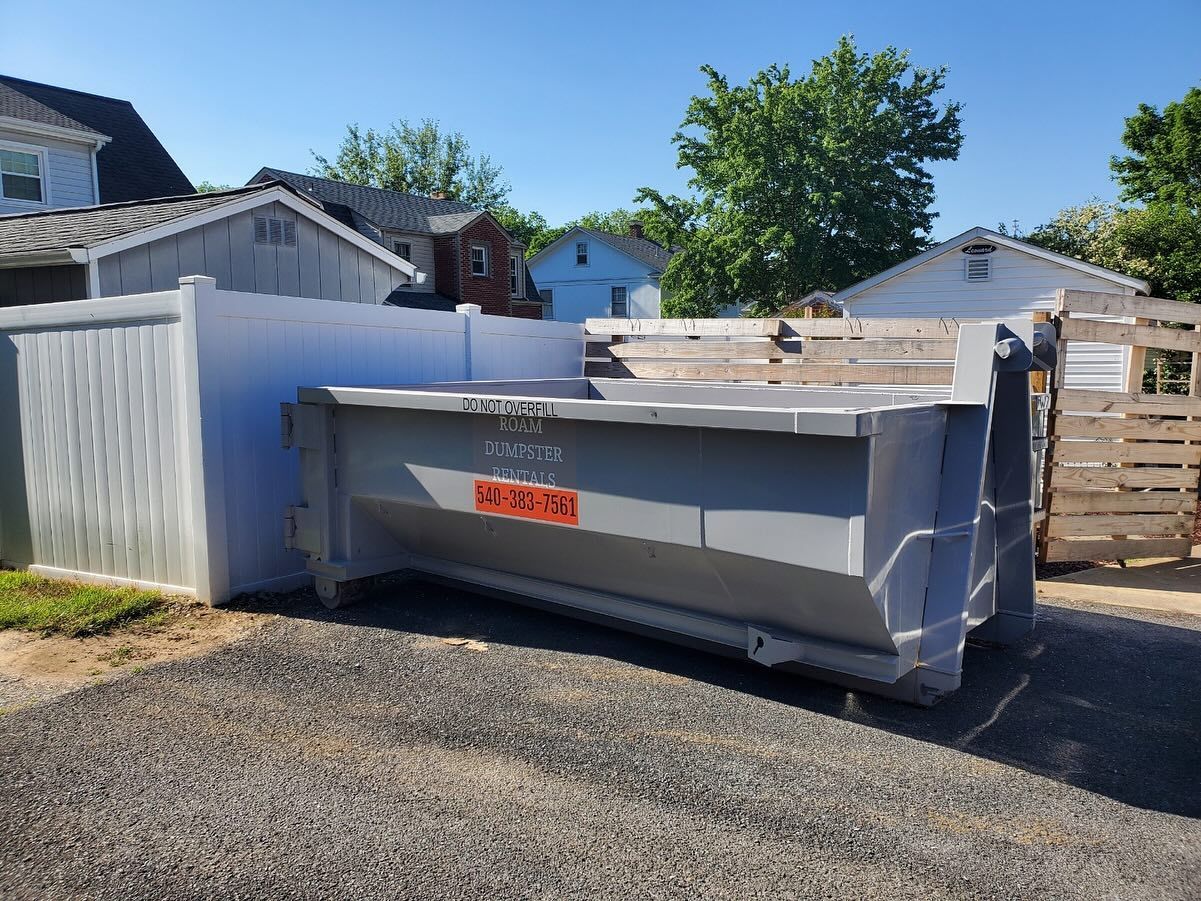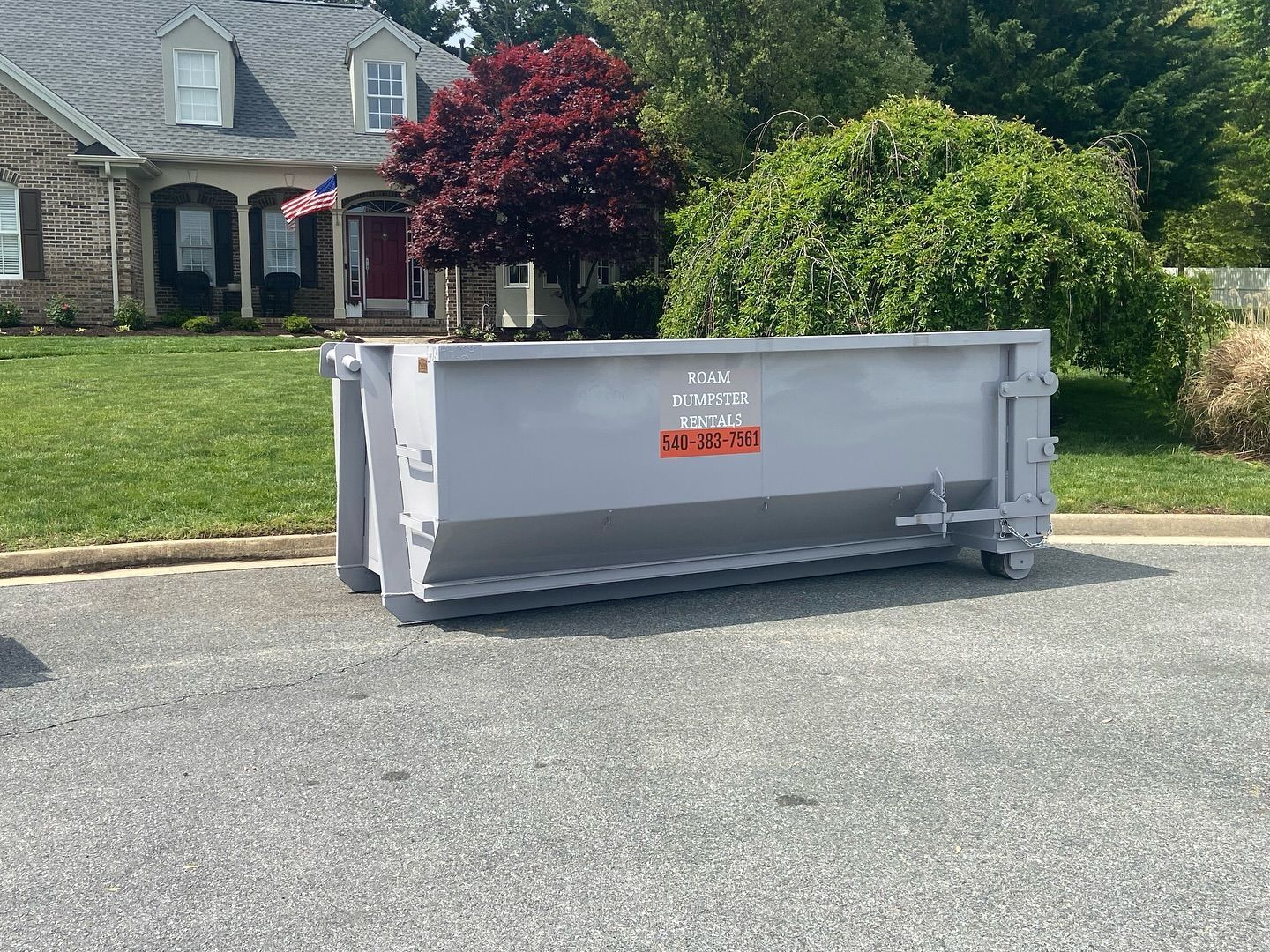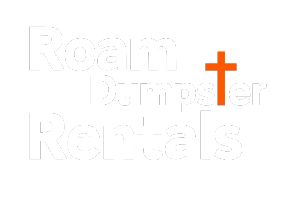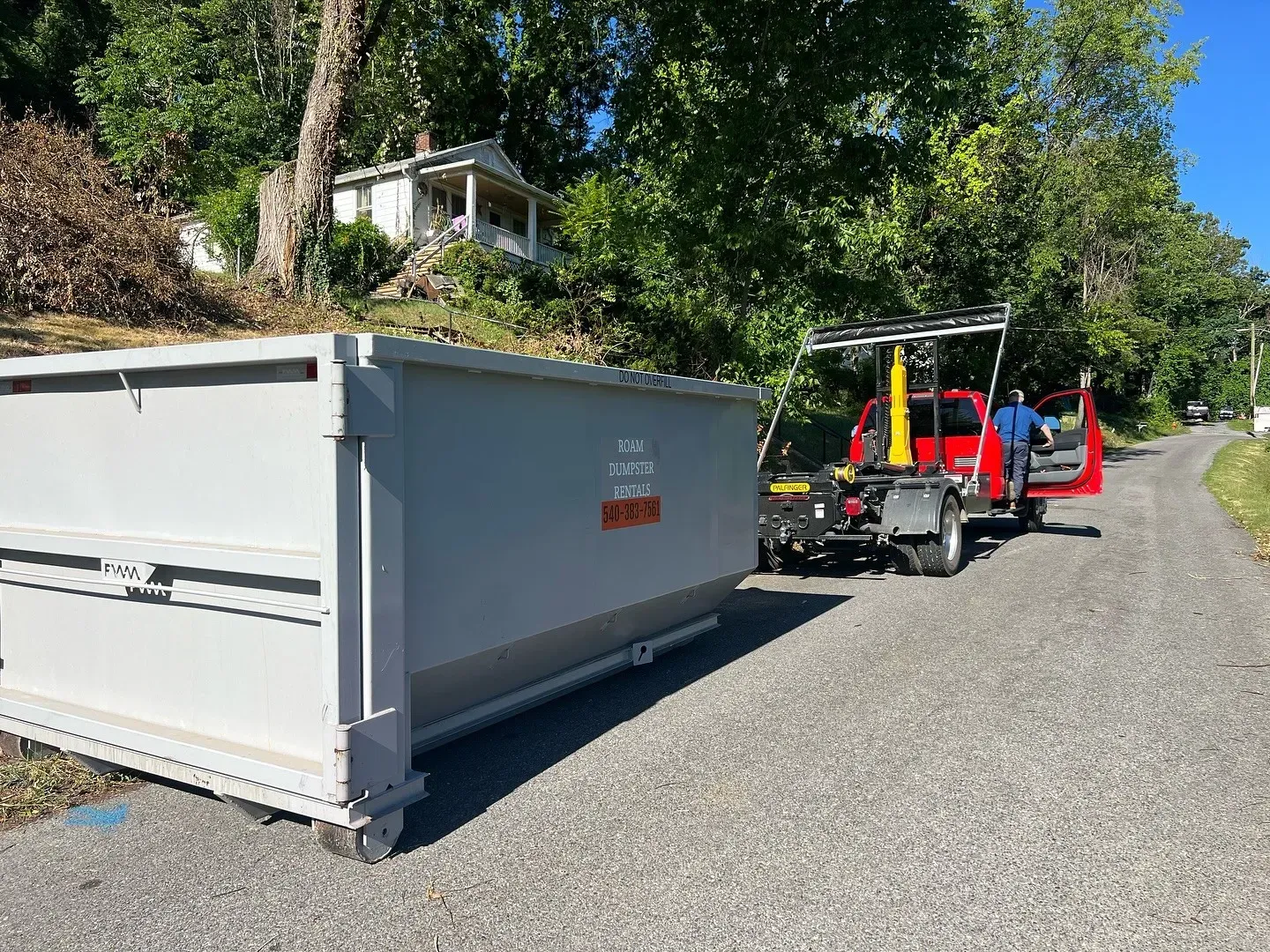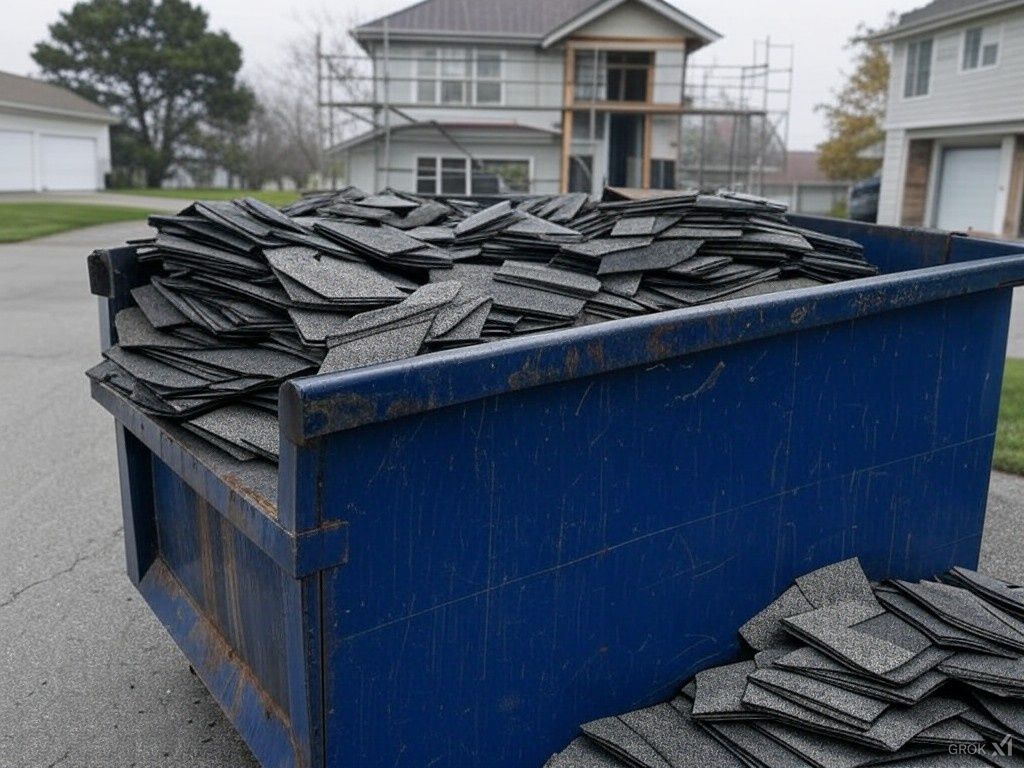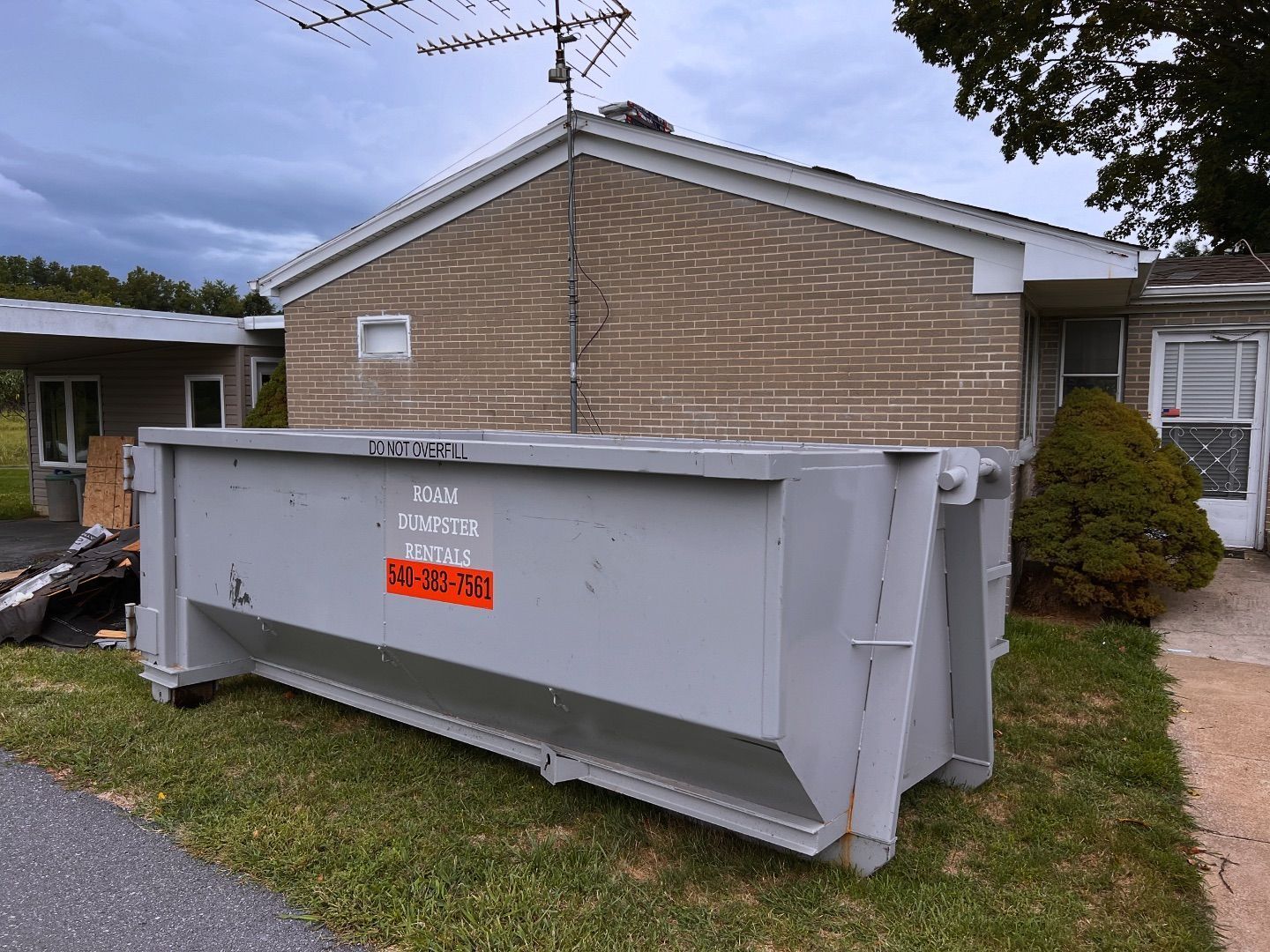What Can You Put In A Roll Off Dumpster Rental? - Full Item List
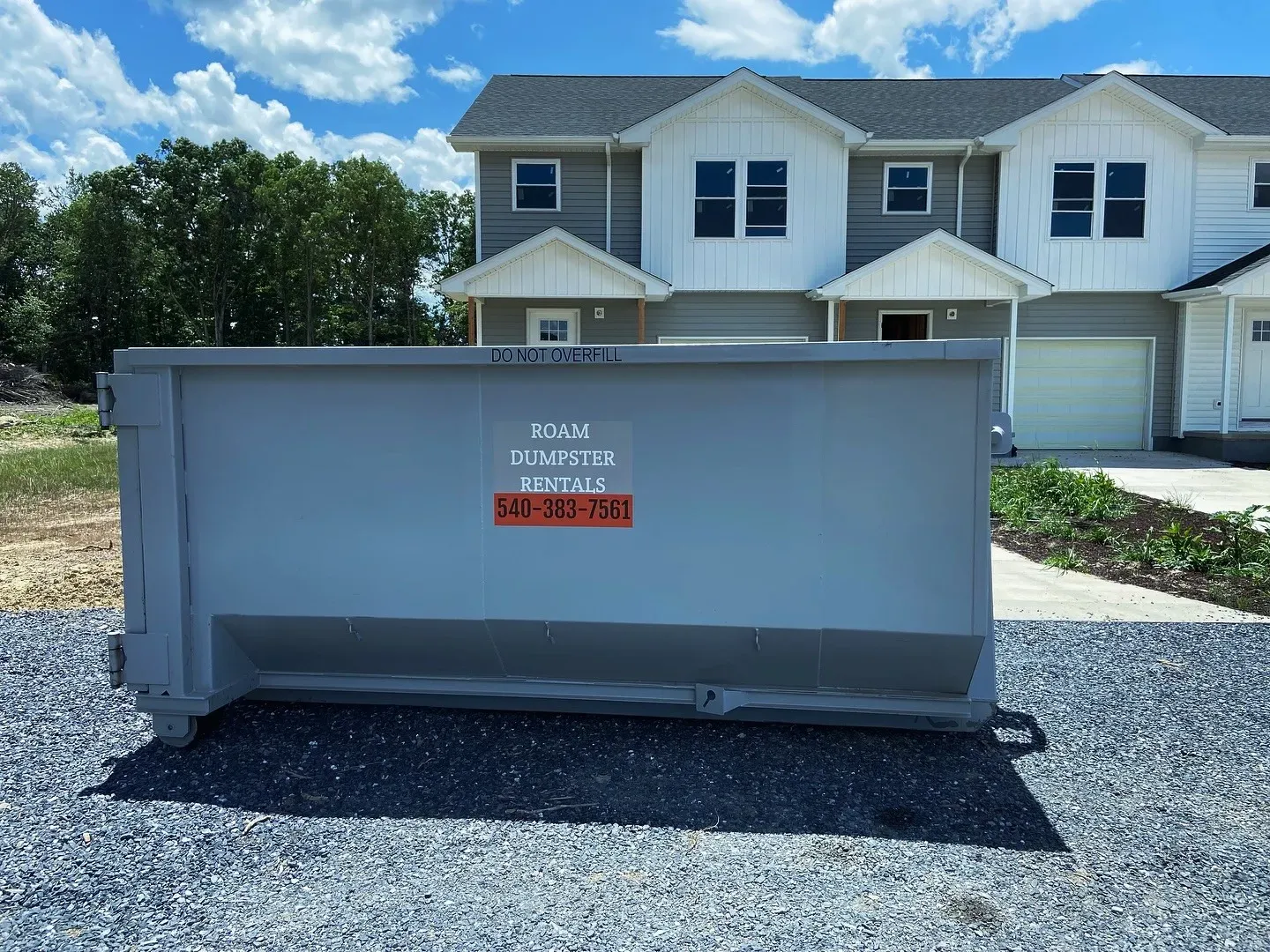
If you’re planning a home cleanout, renovation, or construction project, you’re probably wondering, What can you put in a roll off dumpster rental?
In this blog, we’ll give you a clear, complete list of what’s allowed—and what isn’t—so you can dispose of waste legally, safely, and efficiently. Understanding these rules will help you avoid unexpected fees, prevent delays in your project, and ensure proper disposal of restricted materials.
At
Roam Dumpster Rentals, we’ve spent years helping homeowners, contractors, and businesses navigate waste disposal regulations in Harrisonburg and surrounding areas. Our goal is to make your dumpster rental experience as hassle-free as possible by providing accurate, reliable information you can trust.
Key Takeaways:
- What Can You Put in a Roll Off Dumpster?
You can put most non-hazardous waste in a roll off dumpster, including household trash, wooden furniture, appliances (without refrigerants), yard waste, dirt, small electronics, alkaline batteries, empty aerosol cans, and demolition debris.
- What Can’t You Put in a Roll Off Dumpster?
You cannot put hazardous or restricted items in a roll off dumpster, such as paint, adhesives, car batteries, chemicals, medical waste, hot water tanks, inks, oils, fuels, asbestos, and household cleaning fluids.
- What Can You Sometimes Put in a Roll Off Dumpster for an Additional Fee?
You can sometimes put specialty items in a roll off dumpster for an additional fee, including refrigerators, air conditioners, car batteries, tires, tree stumps, mattresses, upholstered furniture, food waste, dead animals, TVs, computers, hot tubs, large glass items, and overweight debris.
What You CAN Put In A Roll Off Dumpster
A roll off dumpster is designed to handle a wide range of materials, making it a convenient solution for home cleanouts, renovations, construction projects, and commercial waste disposal. While there are some restrictions, most non-hazardous waste can be safely and legally tossed into a dumpster. Below are the most common acceptable waste categories.
Household Trash
Everyday household waste, including paper, plastic, cardboard, food packaging, and non-hazardous materials, can be disposed of in a roll off dumpster. If it’s something you’d typically throw in your curbside trash bin, chances are it’s accepted.
Wooden Furniture
Items like wooden chairs, tables, dressers, and bed frames can go into a dumpster since they are non-hazardous and easily processed at landfills. However, furniture with upholstery, treated wood, or special coatings may have restrictions.
Household Appliances
Appliances such as blenders, mixers, toasters, and other small household appliances are generally accepted, provided they don’t contain hazardous components like refrigerants (which applies to refrigerators and air conditioners). Scrap metal from appliances is also commonly recycled.
Yard Waste
Tree branches, leaves, grass clippings, and small shrubs are commonly accepted in roll off dumpsters, making them ideal for landscaping projects or storm cleanup. Some locations may have yard waste-specific dumpsters to encourage eco-friendly disposal.
Dirt
Most dumpster rental providers allow small amounts of dirt, soil, and sod, but larger loads may require a specialized dumpster due to weight limits. If you’re disposing of large amounts of dirt, check with your provider first.
Electronics
Small electronics such as phones, printers, microwaves, and radios are typically accepted in roll off dumpsters. However, some areas have e-waste recycling laws that require proper disposal for large electronics like TVs and computers.
Alkaline Batteries
Common alkaline batteries (AA, AAA, C, D) are safe to throw in a roll off dumpster because they don’t contain hazardous chemicals. However, rechargeable lithium-ion and car batteries require specialized disposal.
Empty Aerosol Cans
Once an aerosol can is empty, it’s usually safe to dispose of in a dumpster. However, partially full cans pose a fire hazard and should be taken to a hazardous waste facility.
Demolition Debris
Materials from construction and demolition, such as bricks, concrete, drywall, roofing shingles, and flooring, are accepted in roll off dumpsters. These materials are heavy, so you may need to choose a larger dumpster size or be mindful of weight limits.
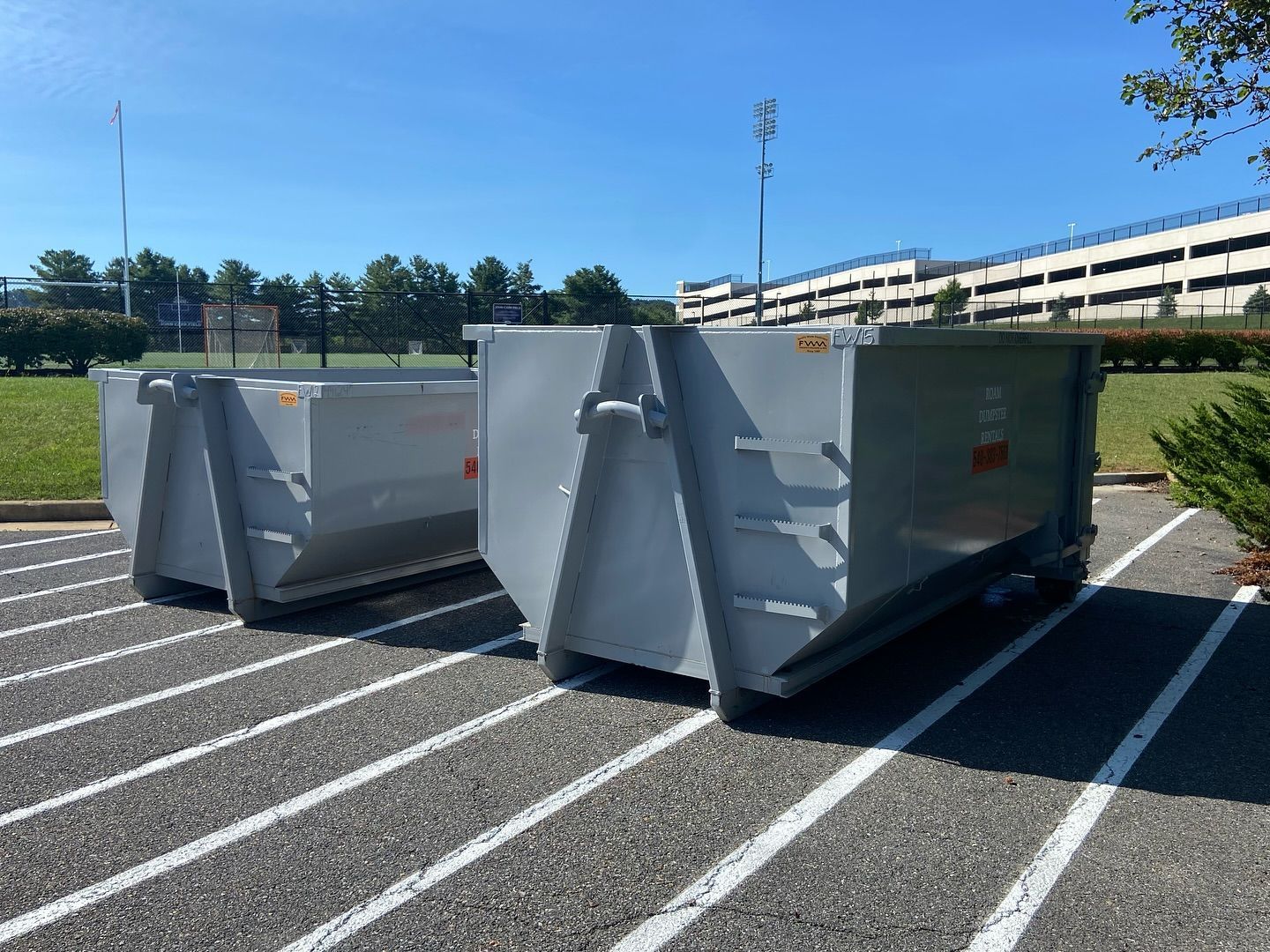
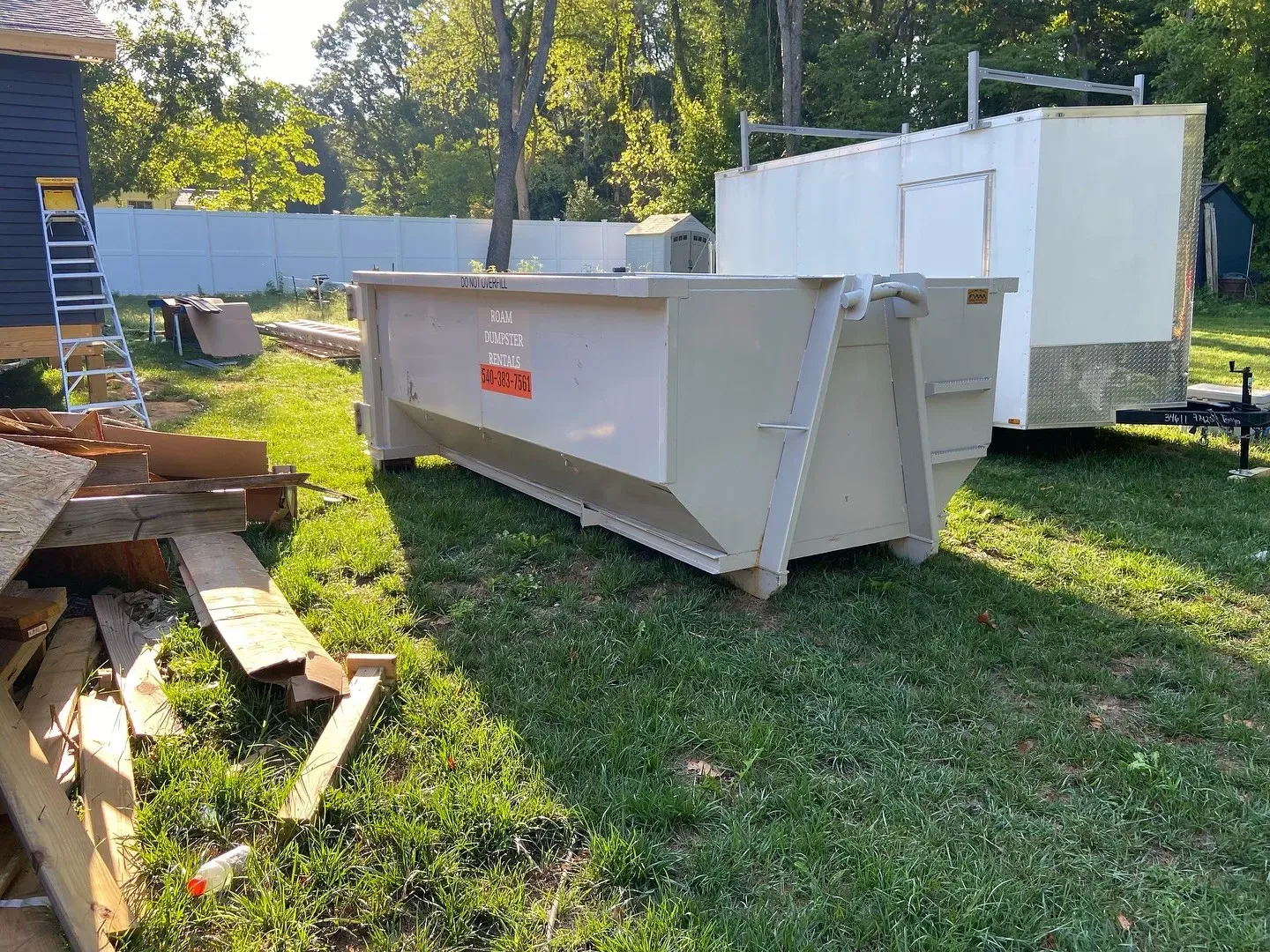
What you CAN’T Put In A Roll Off Dumpster
While roll off dumpsters are versatile, certain materials cannot be disposed of due to safety, health, and environmental regulations. Many of these items contain hazardous chemicals, pose contamination risks, or require specialized disposal methods. Below are the most common prohibited waste categories.
Paint and Lacquers
Wet paint, varnishes, and lacquers contain harmful chemicals that can leach into the environment if not disposed of properly. Instead, allow paint to dry completely or take it to a hazardous waste facility for proper disposal.
Adhesives
Glues, epoxies, and other adhesives can bond to the interior of the dumpster, making removal difficult and causing contamination. It’s best to dispose of these by letting them harden or taking them to a designated waste collection center.
Non-Alkaline Batteries
Rechargeable batteries, car batteries, and lithium-ion batteries contain toxic chemicals like lead and acid, which are hazardous to the environment. These should be recycled at an approved battery disposal center.
Hazardous Materials
Toxic, flammable, or corrosive substances such as pesticides, fertilizers, and chemical solvents are never allowed in a roll off dumpster. These items require disposal through a hazardous waste program to prevent environmental contamination.
Medical Infectious Waste
Needles, syringes, expired medications, and any biohazardous materials must be disposed of through a medical waste facility. These items pose serious health risks and require specialized handling.
Hot Water Tanks
Hot water heaters are often restricted due to their size and the potential for trapped gases inside. Instead, take them to a scrap metal recycling center for proper disposal.
Inks and Resins
Printer inks, paint resins, and industrial-grade adhesives can be highly toxic and difficult to remove from landfill sites. Many locations require these items to be taken to designated hazardous waste facilities.
Oils and Fuels
Motor oil, gasoline, diesel, and propane tanks are highly flammable and pose significant fire hazards. Instead, take these to an auto shop, recycling center, or hazardous waste facility.
Asbestos
Asbestos-containing materials are dangerous to human health, as exposure can cause severe respiratory illnesses. These materials require professional abatement services and should never be placed in a standard dumpster.
Household Cleaning Fluids
Bleach, ammonia, and other chemical cleaners can create toxic fumes when mixed and are considered hazardous waste. Dispose of these at a local hazardous waste collection event or facility.
What You Can SOMETIMES Put In A Roll Off Dumpster
Some roll off dumpster companies accept specialty items for an additional fee to cover disposal costs and ensure compliance with regulations. Below is a breakdown of what it costs the company to dispose of these items and what they typically charge to remain profitable.
| Specialty Item | Average Cost |
|---|---|
| Refrigerators | $30 - $75 |
| Air Conditioners | $30 - $75 |
| Car Batteries | $10 - $25 |
| Tires | $5 - $15 per tire |
| Tree Stumps | $50 - $150 |
| Mattresses | $20 - $50 |
| Upholstered Furniture | $30 - $60 |
| Dead Livestock | $50 - $200 |
| Televisions | $20 - $50 |
| Computers & Monitors | $20 - $50 |
| Hot Tubs | $75 - $150 |
| Construction Debris Over Weight Limit | $50 - $200 per extra ton |
Why Knowing What You Can Put In A Roll Off Dumpster Matters
Understanding what you can and cannot dispose of in a roll off dumpster is essential for avoiding extra costs, complying with regulations, and ensuring responsible waste management. Disposing of restricted items improperly can lead to fines, environmental hazards, and unexpected project delays. Here are the top five reasons why knowing dumpster guidelines matters:
#1: Avoid Unexpected Fees
Dumpster rental companies charge extra fees for restricted items because improper disposal requires additional handling. Knowing the rules upfront helps you avoid surprise charges and stay within budget.
#2: Stay Compliant with Local Laws
Every city and state has its own waste disposal regulations. Placing prohibited items in a dumpster can result in fines from waste management authorities, making it crucial to understand local guidelines before throwing items away.
#3: Prevent Environmental Damage
Hazardous materials like paints, oils, and batteries can contaminate soil and water supplies if disposed of improperly. Following proper disposal methods protects the environment and ensures waste is handled safely.
#4: Keep Waste Haulers & Landfill Workers Safe
Some materials, like aerosol cans, propane tanks, and chemicals, can be dangerous to waste handlers. Understanding disposal restrictions helps reduce workplace hazards and ensures the safety of those processing your waste.
#5: Improve Recycling & Sustainability
Many items that aren’t allowed in dumpsters—like electronics and appliances—can often be recycled or repurposed instead of ending up in landfills. Knowing disposal guidelines helps you reduce waste and contribute to a more sustainable future.
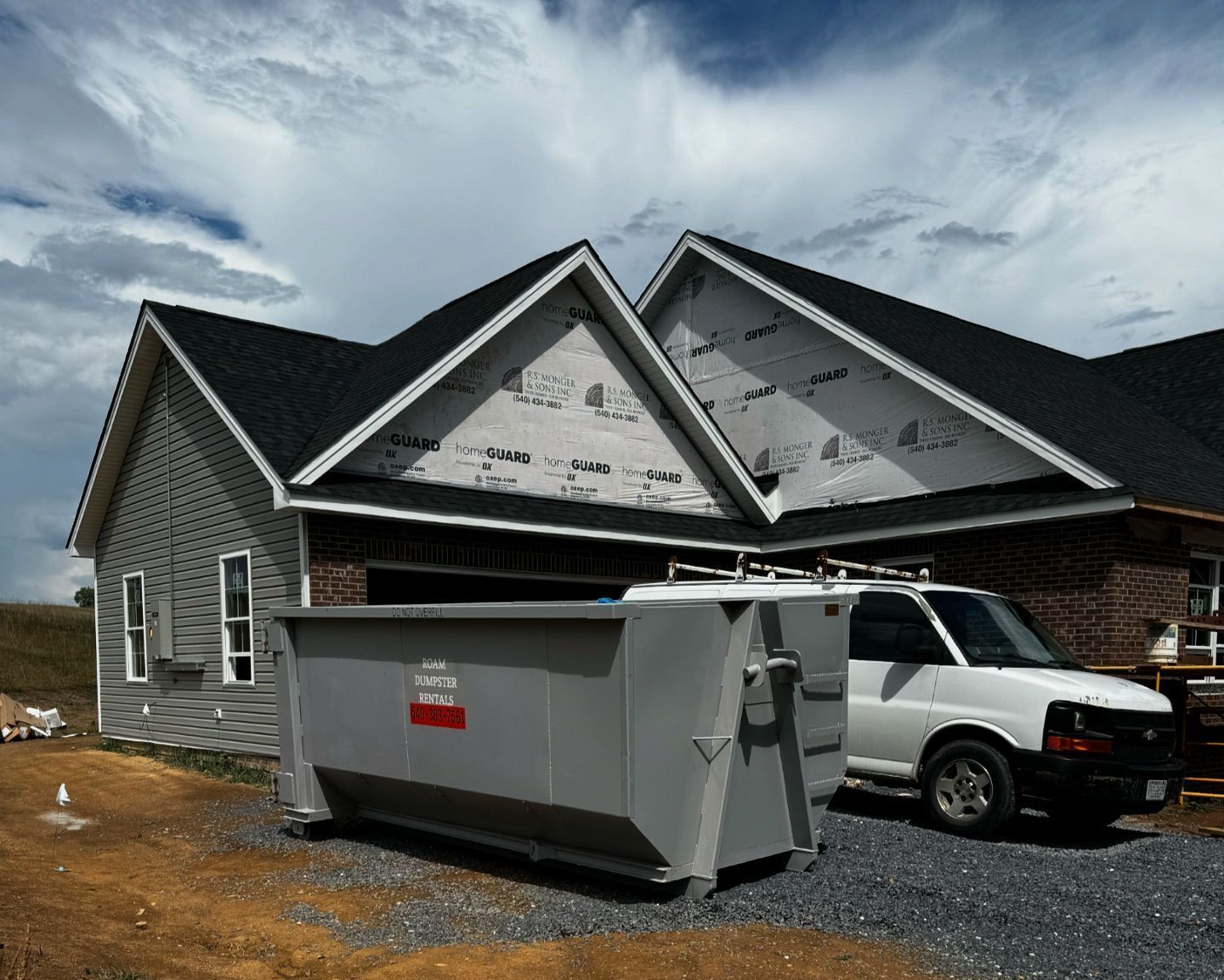
FAQs About Roll Off Dumpsters
What items are prohibited in a roll off dumpster?
Items such as hazardous materials, tires, freon appliances, televisions, paint, asbestos, batteries, oils, fuels, and tar-treated railroad ties are commonly prohibited from disposal in roll off dumpsters due to environmental regulations.
How much does it cost to rent a roll off dumpster?
The cost of renting a roll off dumpster varies based on factors like location, dumpster size, rental duration, and the type of debris being disposed of. It's advisable to contact local dumpster rental providers for specific pricing tailored to your needs.
What size roll off dumpster do I need for my project?
Roll off dumpsters come in various sizes, typically ranging from 10 to 40 cubic yards. The appropriate size depends on the scope of your project:
- 10-yard dumpster: Suitable for small cleanouts or minor renovation projects.
- 20-yard dumpster: Ideal for medium-sized renovations or roofing projects.
- 30-yard dumpster: Best for larger home additions or construction projects.
- 40-yard dumpster: Used for major construction or large-scale cleanouts.
Consulting with a dumpster rental provider like Roam Dumpster Rentals can help determine the best size for your specific needs.
How long can I keep a roll off dumpster on my property?
Rental periods for roll off dumpsters vary by company but typically range from 7 to 14 days. If you require the dumpster for a longer period, many providers offer extended rentals for an additional fee. It's important to discuss your project's timeline with the rental company to ensure adequate time for your needs.
Do I need a permit to place a roll off dumpster on my property?
Permit requirements depend on local regulations and where the dumpster will be placed. If the dumpster is situated on private property, a permit is usually not necessary. However, placing it on public property, such as a street or sidewalk, may require a permit. It's essential to check with your local municipality or the dumpster rental company to determine if a permit is needed in your area.
More Dumpster Resources
Need A Roll Off Dumpster In Harrisonburg Virginia? - Book Now
At Roam Dumpster Rentals, we provide the best and most transparent pricing for roll off dumpster rentals in Harrisonburg and surrounding areas. Whether you're tackling a home cleanout, renovation, or construction project, we make waste disposal simple, affordable, and hassle-free. Visit our website and get your roll off dumpster today!
